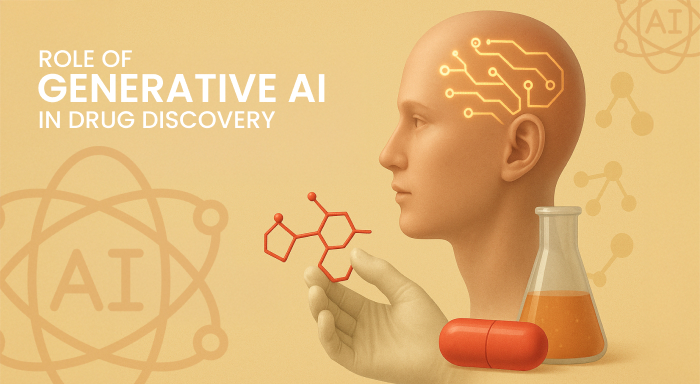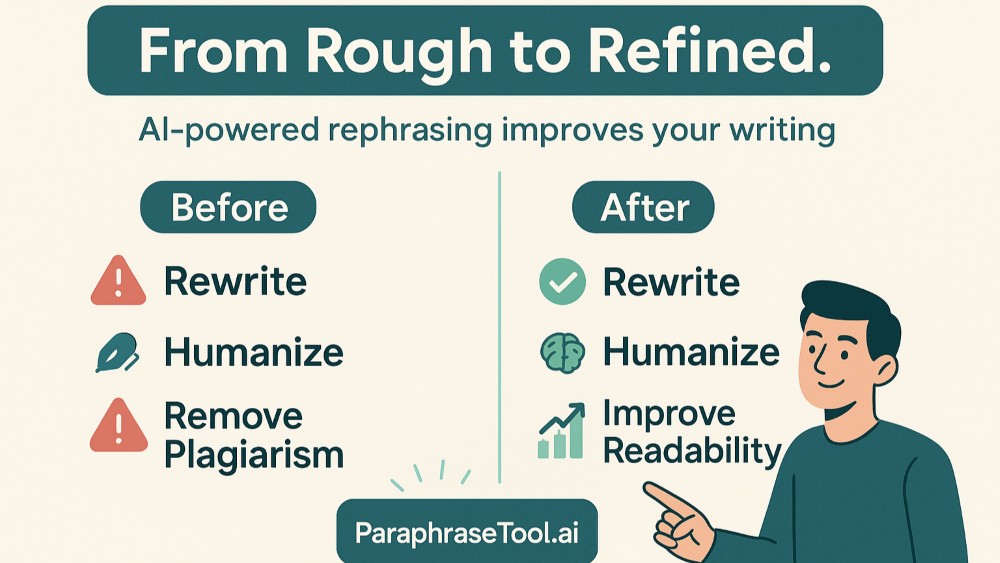Artificial Intelligence technology is full of promise to bring transformation across the biotech and pharma industries. Specifically, Generative AI in Drug Discovery provides revolutionizing solutions for pharmaceutical and biotech companies. With the use of sophisticated algorithms, Generative AI anticipates the behavior of molecules and optimizes their potency, hence economizing and improving the reliability of experiments.
This article will delve into specific strategies these industries can employ to harness Generative AI’s capabilities in the pharma industry.
Understanding Generative AI
Generative AI is a sophisticated branch of artificial intelligence that uses machine learning models to create new data samples based on patterns learned. Developed over large language models, the technology gets trained on millions of existing examples and goes on to produce appropriate content in different forms.
Benefits of Generative AI Implementation
- Boosting Efficiency and Speed
Generative AI algorithms accelerate the speed of the time-consuming traditional drug discovery processes by generating vast libraries of virtual compounds and predicting their properties. This enables researchers to focus on options that come across as most promising. As a result, a significant amount of resources as well as time is optimised.
- Enlarging the chemical space
Generative AI models discover and create new chemical structures that can perhaps not have been conceived earlier by human scientists. The algorithms create new avenues for designing drugs with better efficacy and fewer side effects.
- Concentrating on Particular problems
Generative AI is trained on huge data regarding how drugs react with the body. It makes it possible for it to recommend new drug candidates for diseases. This enables scientists to identify medicines that are likely to function well for those medical issues.
- Bypassing data constraints
Traditional drug discovery faces one of the limitations being the limited quality and availability of data. Generative AI in medicine bypasses this constraint since it learns from available data and creates new data points. The synthetic data can then be utilized to train models and boost accuracy, leading to improved drug discovery results.
- The overcoming of drug resistance
Drug resistance is a severe healthcare issue today. Generative AI may assist in addressing this issue by developing new drugs that specifically target drug-resistant germs and illnesses. This could result in new solutions for combatting antibiotic resistance and other hard-to-treat diseases.
- Facilitating collaboration:
Such platforms enable easy interaction for researchers to converse, exchange ideas, and learn from one another. They can exchange their results, generate ideas, and solve complex challenges of drug discovery collaboratively. This type of collaboration accelerates progress and ignites new ideas.
Related Reads
Generative AI vs LLM: What You Need to Know
Revolutionizing E-commerce with Generative AI: Product Design and Virtual Try-Ons
Implementation Challenges
Technical Specification
Despite the encouraging potential of generative artificial intelligence in drug discovery, successful implementation must carefully consider a number of obstacles:
- Quality training data is crucial to the technology’s performance because poor input data produces inaccurate predictions and questionable models.
- Regulators may find it difficult and take longer to approve complex AI processes when they are described.
Well crafted prompts must efficiently guide the technology to produce useful results.
Implications for Regulation and Ethics
- Providing customised medications rather than rejecting populations based on genetic markers.
- HIPAA and other privacy regulations must be followed when handling patient data.
- Data security and patient privacy should come first during implementation.
Price and Availability
It can be expensive to generate access to generative AI systems with pertinent data, but specialized Generative AI in Drug Discovery solutions are getting cheaper.
Important Characteristics of Generative AI
The technology uses several sophisticated techniques:
• Generative Adversarial Networks: These models use two neural networks, a discriminator and a generator, in combination to produce real-world data samples.
• Variational Autoencoders: Similar to Analogous to autoencoders, these models create new data samples by encoding input data and then decoding it.
• Transformer Models: These enable the creation of exact molecular structures by understanding the complex relationships between atoms.
Generative AI uses advanced algorithms to predict molecular behaviour and optimise performance through intricate computations.
Applications Across Drug Discovery Stages
Target Identification and Validation
Extensive biological and clinical information is analyzed by generative AI to validate and identify promising molecular targets of disease. The technology is useful as it infers gene, protein, and pathway interactions and provides meaningful insights for targeting disease mechanisms.
Lead Discovery
Advanced Artificial Intelligence models, including Artificial Neural Networks (ANNs) and Recurrent Neural Network (RNNs), facilitate novel chemical structure discovery in lead discovery stages. These platforms accelerate the identification of lead compounds by maximizing candidate selection and predicting binding affinity and pharmacological activity.
Lead Optimization
The technology maximizes lead compounds by suggesting specific molecular alterations for enhanced efficacy and better safety. The process is tremendously useful in generating medication candidates with superior pharmacological attributes and reduced potential side effects.
Preclinical Testing
In preclinical phases, generative AI analyzes vast amounts of data to analyze safety, efficacy, and toxicity profiles. The system has the ability to predict therapeutic outcomes and adverse effects with lower requirements for extensive in vitro and in vivo testing.
Clinical Trials
Artificial intelligence has become a must in clinical trial planning and execution. The technology scans patient information and clinical trial protocols in order to identify candidate patients for different trials, which increases recruitment levels and trial success.
Key Use Cases in Drug Discovery
Drug Compound Optimization
The technology transforms drug development by suggesting precise modifications to already-existing compounds. Key benefits consist of:
- Enhanced therapeutic efficacy and safety profiles
- Among other pharmacological properties, increased solubility and binding affinity
- Faster evaluation of AI-recommended modifications
- Less time and money required for optimisation than previously
Data-Based Patient Stratification
Sophisticated algorithms analyse massive patient datasets to classify individuals into subgroups based on expected drug responses. This customised approach:
- Utilises unique patient characteristics and genetic profiles
- Increases the treatment's effectiveness and accuracy
- Allows for customised treatment regimens
- Reduces side effects while enhancing patient results
Rapid Drug Development
Generative AI speeds up drug design by creating new candidates from scratch using complex algorithms that evaluate compounds based on:
- Chemical stability and viability
- The possibility of optimising the structure
- Characteristics of binding affinity
- Toxicological profiles and safety margins
Virtual Screening Capabilities
Technology is revolutionising drug discovery through advanced virtual screening that:
- Simulates the interaction between drug candidates and target proteins.
- Effectively weeds out less promising candidates
- Evaluates biological activity in molecular arrays without requiring laboratory testing.
- Offers faster and more cost-effective development processes.
Generation of Chemical Compound in Silico
Through computer based testing, Generative AI in Drug Discovery transforms the way scientists create new chemical compounds. This method:
- Makes it easier to evaluate potential compounds quickly and thoroughly
- Lowers the costs associated with traditional chemical research conducted in laboratories.
- Accurately forecasts the actions, interactions, and binding affinities of molecules
- Less physical testing is required when high-precision chemical simulations are used.
Future Outlook
Generative AI is a transformative driver of drug research. The ability of the technology to design compounds automatically, process massive data sets, and tailor drug candidates is revolutionizing the discovery and development of new medicines.
Success in developing ai in drug discovery is more than applying appropriate models. Institutions must prioritize the incorporation of workflow, quality data management, and meticulous employee training to realize the full potential of the technology.
Conclusion
Generative AI is accomplishing a lot more than simply automating drug discovery work—it's revolutionizing the entire process. With the help of strong algorithms and huge data, AI can test numerous ideas simultaneously, speeding up research, reducing its cost, and increasing its accuracy in comparison to conventional approaches that consume lots of time and resources.
With this technology, researchers can even create treatments that are specifically designed for the individual patient while reducing development costs and time. As Generative AI in Drug Discovery continues to get better, it could result in more efficient medicines and revolutionize the way the pharmaceutical industry addresses its greatest challenges.
Firms adopting this technology today are at the forefront of developing innovative therapies that address pressing medical requirements in a better way than ever before.








